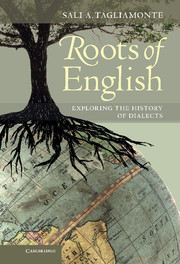Book contents
- Frontmatter
- Contents
- List of Figures
- List of Tables
- Preface
- Acknowledgements
- Abbreviations
- 1 Introduction
- 2 Dialects as a window on the past
- 3 The Roots Archive
- 4 Methods of analysis
- 5 Word endings
- 6 Joining sentences
- 7 Time, necessity and possession
- 8 Expressions
- 9 Comparative sociolinguistics
- 10 The legacy of British and Irish dialects
- Notes
- References
- Index
10 - The legacy of British and Irish dialects
Published online by Cambridge University Press: 05 November 2012
- Frontmatter
- Contents
- List of Figures
- List of Tables
- Preface
- Acknowledgements
- Abbreviations
- 1 Introduction
- 2 Dialects as a window on the past
- 3 The Roots Archive
- 4 Methods of analysis
- 5 Word endings
- 6 Joining sentences
- 7 Time, necessity and possession
- 8 Expressions
- 9 Comparative sociolinguistics
- 10 The legacy of British and Irish dialects
- Notes
- References
- Index
Summary
I would nae want tae gie mi brogue away.
(Robin Mawhinney, 55, PVG, 002)In this chapter I ponder the legacy of these amazing dialects and consider what gifts they offer us for the future. Together the findings provide a synthetic perspective from many different subsystems of grammar as represented by the elders of twelve different communities in Scotland, England and Northern Ireland at the turn of the twenty-first century (2001–2003). The research programme as a whole complies with the standards for comparison laid out in earlier research, including the case for historical connection, ‘the joint weight of several sets of data’ (Schneider, 2004) and accountable comparative methodology. Let us now consider the conclusions that can be drawn from the results.
Overall, the dialects of the Roots Archive are highly conservative. Indeed, the variety spoken by the oldest generation of individuals in the outlying, off-the-beaten track locations lag far behind what is going on in the urban centres and mainstream populations of Britain. Features that are moribund or gone forever virtually everywhere in the world can be studied here. The peripherality of some of the communities is a critical part of the explanation for long-term maintenance of these features. For each linguistic feature I have examined, the communities exhibit a profile that is consistent with an earlier stage in the ongoing development of that system in English more generally. As historical linguistics has documented, relic areas preserve antiquated features. Yet it is astounding that the tracks of history endure so long. The unique socio-cultural milieu of the North has contributed a great deal to this extensive long-term, socially ingrained, maintenance. As Chesshyre (1987) enshrined in his evocative description of Scotch Corner, the ‘north is another country’.
- Type
- Chapter
- Information
- Roots of EnglishExploring the History of Dialects, pp. 195 - 213Publisher: Cambridge University PressPrint publication year: 2012



